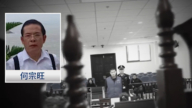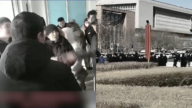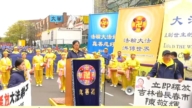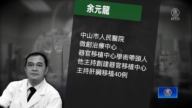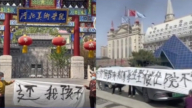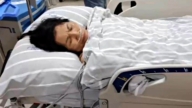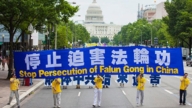【新唐人2014年12月17日訊】1996年,內蒙古年僅18歲的呼格吉勒圖,被冤指為姦殺犯,並在短短61天後被執行死刑。他的父母多年上訪無效,直到2005年真兇落網,法院再審後,才於今年的12月15號判決呼格吉勒圖無罪。有評論說,中共司法不獨立加上所謂的立功受獎,冤假錯案層出不窮,今天呼格吉勒圖的案件是因為真兇落網,才不得不破案,那麼那些還沒有真兇落網的冤案,又有多少?
15號,內蒙古自治區高級法院撤銷該院1996年作出的,關於呼格吉勒圖案的二審刑事裁定:撤銷呼和浩特市中級法院1996年對呼格吉勒圖案作出的一審刑事判決,宣告原審被告人呼格吉勒圖無罪。
內蒙高院到呼格家,向呼格父母宣佈了再審結果:撤銷1998年內蒙古高院判決呼格流氓罪、強姦罪、故意殺人罪罪名,經過再審之後判決:呼格吉勒圖無罪!
愛子18年沉冤昭雪,呼格父母抱頭痛哭。在呼格的墳前,兩位老人焚燒再審無罪判決文書的複印件。18年的冤屈,9年的上訪之路,這條路讓這家人走得很辛苦。這一紙無罪判決,卻又來的這麼遲。
1996年4月9號,呼和浩特市第一毛紡廠家屬區公廁內,一名女子被姦殺。年僅18週歲的呼格吉勒圖,前往公安機關報案,卻被認定為兇手。案發僅僅61天後,法院判決呼格死刑,並立即執行。
呼格死後,父母開始上訪,但都沒有獲得回應,而「破案」的多名警官都因「迅速破獲大案」,獲得立功表彰。
2005年,被媒體稱為「殺人惡魔」的內蒙古系列強姦殺人案兇手趙志紅落網。趙志紅交代的第一起殺人案就是「4.09」毛紡廠女廁女屍案,但是,呼格吉勒圖卻遲遲不能洗脫罪名,引發媒體和社會的關注。
今年11月20號,在各界輿論的廣泛壓力下,中共內蒙古高院才被迫宣佈對呼格案重新審判。
江蘇東南大學法學院教授張讚寧認為,中國司法不獨立,造成很多這樣的冤假錯案。
江蘇東南大學法學院教授張讚寧:「我們的司法制度有一個很壞的制度,就是立功受獎,你破了案就受獎,另外如果沒有在規定的時間裏破案,那麼這個公安局局長的烏紗帽可能就要丟掉,這樣的話,就避免不了造成冤假錯案。破不了案怎麼辦,那麼就隨便地在社會上找一個人來進行刑訊逼供,在嚴刑拷打下當事人就承認了。」
廣東維權律師隋牧青:「冤案產生從大方面來說,是司法制度有問題,就是警方權力太大,而且中國來說是一個制度上的問題,比如說包括陞遷,陞遷跟破案率都有掛鉤。」
張讚寧進一步分析,由於中共公檢法不獨立,因此不能相互監督。
張讚寧:「由於政法委領導公檢法,那公檢法就不可能獨立,把公檢法辦成一條龍的作業線,它們是相互配合的,不存在相互監督的問題,而且更糟糕的是,政委法的書記往往是公安局的局長兼任的,本來是檢察院要監督公安局,這樣檢察院就不可能監督公安局,法院也不可能獨立審判,結果就造成很奇怪的現象。」
中共官方媒體報導說,「呼格吉勒圖案」在此之際重審,成為落實所謂依法治國精神的最新案例。而且據說,當局已組成調查組,調查「呼格吉勒圖案」當年所有參與辦案的警員。
廣東維權律師隋牧青:「明明這是一件非常可恥的事情,又成了當局大肆宣傳如何英明的一件事情,那麼現在藉著這個冤案,說甚麼現在這個司法如何開明,甚麼有錯必糾,你想呼格吉勒圖這個事情,都已經九年了,多麼惡劣啊,就是不給人家平反,這種事情根本不需要宣揚,應該馬上追究那些土匪警察的責任。」
這條消息也引起網友熱議,認為應該讓當初的相關辦案人員接受制裁。有網友說:為了追求辦案神速,為了撈取功名,就無視生命,草率槍殺無辜生命。另一名網友也說:這和故意殺人有甚麼區別,不嚴懲,叫人民怎麼相信法律?
採訪/朱智善 編輯/黃億美
Executed for Murder: Man Found Innocent After 18 Years
Hugejiltu was just 18 when he was charged with raping
and murdering a woman in Hohhot, Inner Mongolia, in 1996;
he was put to death 61 days after the woman’s murder.
His parents appealed for many years until 2005,
when another man confessed to the crime.
The court then reopened the case and changed
the original sentence to “not guilty", on December 15th.
Some critics say that a lack of an independent judiciary that
is separate from the Chinese Communist Party (CCP), plus
the so-called “rewarding for meritorious service" that pushes
for results, are causing mistakes to be made one after another.
How many cases of injustice are left?
Dec. 15—Inner Mongolia Autonomous Region’s High Court
revoked the first criminal verdict from Hohhot Intermediate
People’s Court in 1996, declaring the original defendant,
Mr. Hugejiletu, innocent.
The High Court announced the new verdict to Huge’s parents,
which upheld his innocence, and revoked the original charge
of hooliganism, rape and intentional homicide from 1998.
The parents shed tears for their son, who had been vindicated
after 18 years, and following nine years of petitioning.
At Huge’s grave, two elderly gentlemen burn a copy of
the “not guilty" verdict retrial document.
For his loved ones, the acquittal paper has come too late.
On April 9, 1996, a woman was raped and killed
in a public restroom of Hohhot’s first woolen mill.
Only 18 years old at the time, Hugejiltu had visited
the CCP’s public security organs to report the case,
but was accused of being the killer and was executed to death
by the court only 61 days after the incident.
His parents started to appeal since his death,
but received no response.
The several police officers involved received
meritorious rewards for quickly resolving the case.
In 2005, serial rapist and murderer, Zhao Zhihong—
named"devil killer" by the media—was arrested.
Zhao Zhihong confessed that his first homicide was
the female restroom case in woolen mill.
The injustice against Hugejiletu triggered concern
from society and the media.
Nov. 20, 2014, under the public pressure, the Inner Mongolia
High Court was forced to re-open Huge’s case.
Professor of Jiangsu Southeast University Law School,
Zhang Zanning says China’s judiciary is not independent,
and this results in many cases of injustice.
Zhang Zanning: “A very bad rule in our judicial system is
that one will be rewarded for ‘meritorious service’—actually,
you will lose your job if you don’t resolve a case within
a specific timeframe; so of course there are mistakes."
“They push innocent people to plead guilty through torture,
if they can’t resolve the case."
Mu Suiqing, Guangdong human rights lawyer: “One reason
for the injustice is that the police have too much power."
“It’s a problem in the system in China; that promotion
must be linked with your detection rate."
Zhang Zanning says the public security organs are
not independent and cannot supervise each other.
Zhang Zanning: “It’s impossible to have independent public
security organs under the Politics and Law Committee’s rule.
“The public security organs are on a single production line
and cooperate with each other; they don’t supervise."
“Even worse, the secretary of the political and law committee
is also served by the director of the Public Security Bureau."
“The Procuratorate was supposed to supervise the Public
Security Bureau, but in this case it is impossible,
and the court cannot be independent."
The CCP’s mouthpiece reported that the recent reopening of
Hugejiletu’s case is a latest example of the so-called
“implementation of ruling by law".
It is said that an investigation team has been set up to
investigate all police officers who were involved in the case.
Mu Suiqing: “It’s obviously a very shameful thing, but it has
been hyped up to portray a currently more “open" judicial
system, and mistakes must be corrected."
“You can tell how bad it is, because it’s taken so many years
before vindicating him."
“They shouldn’t promote it, but immediately
investigate those policemen."
The case has triggered hot discussions among netizens,
who say those involved should receive punishment.
Some netizens said: “Killing the innocent is just in pursuit of
handling the case rapidly and gaining fame."
Another: “The original verdict is no different from intentional
homicide; how can people believe the law without severe
punishment being brought to those involved in the charge?"
Interview/Zhu Zhishan Edit/Huang Yimei


